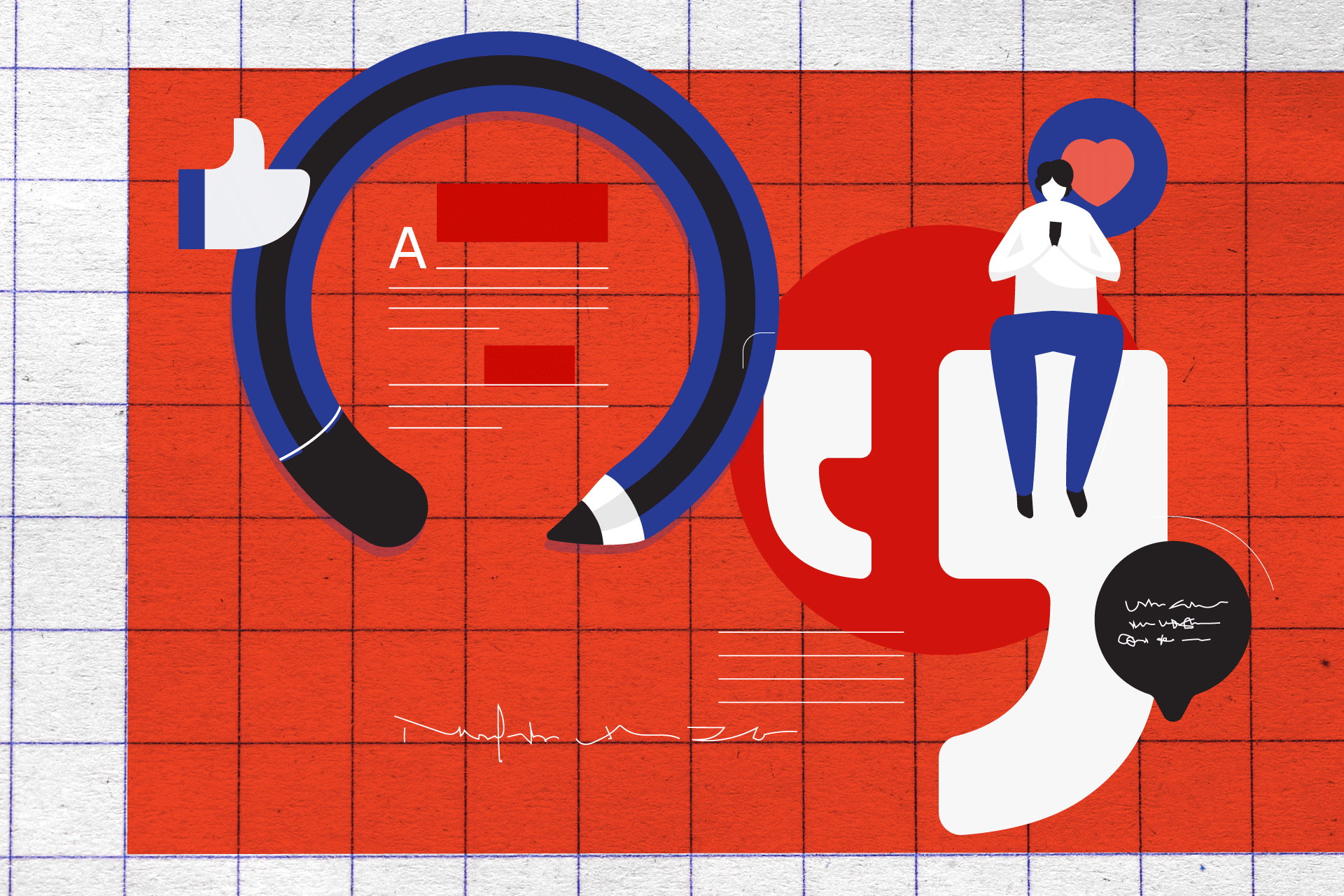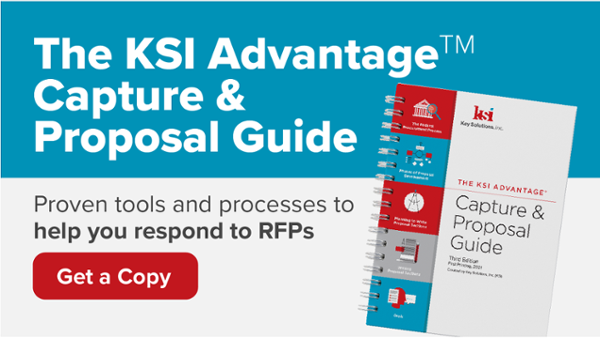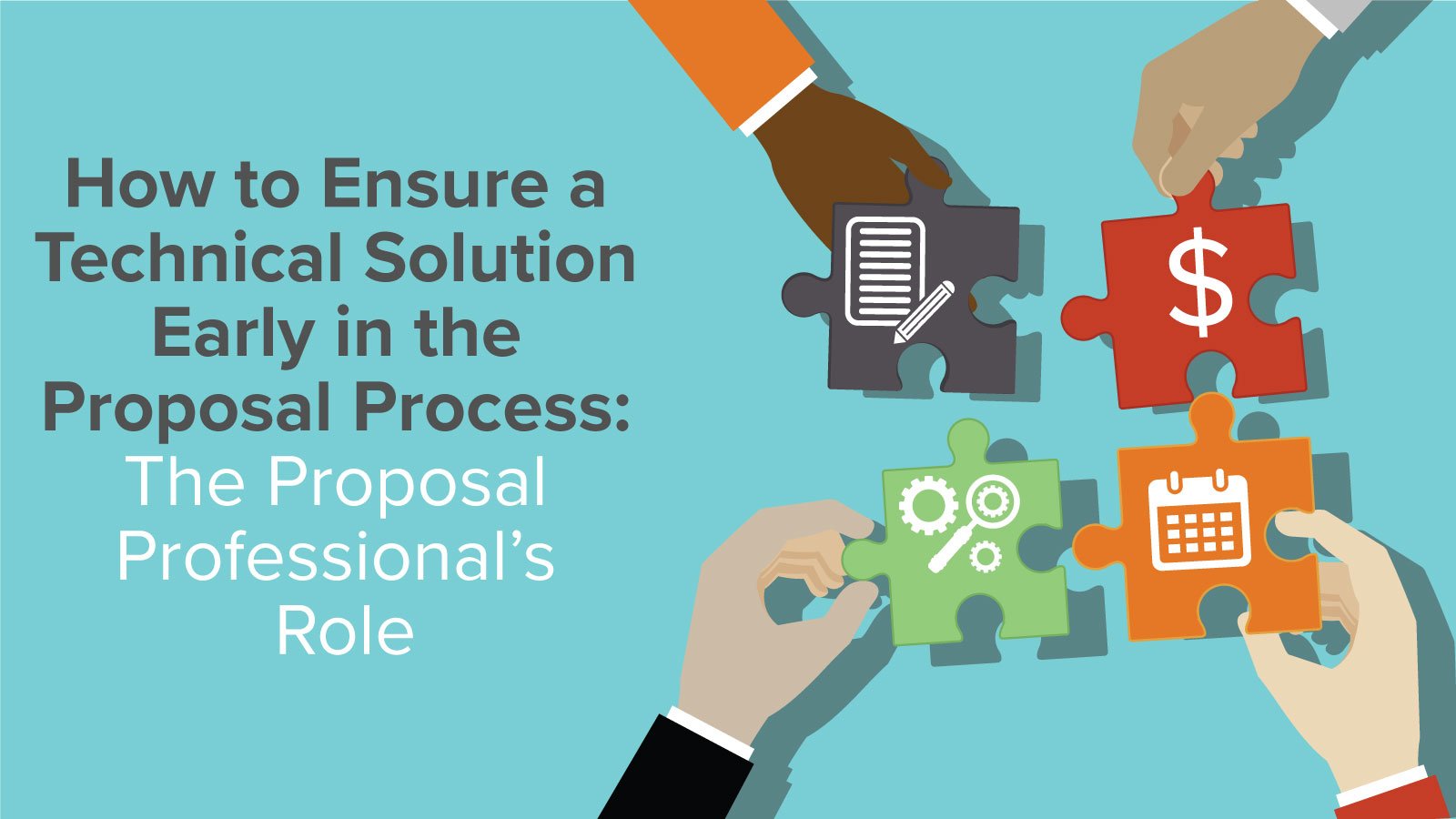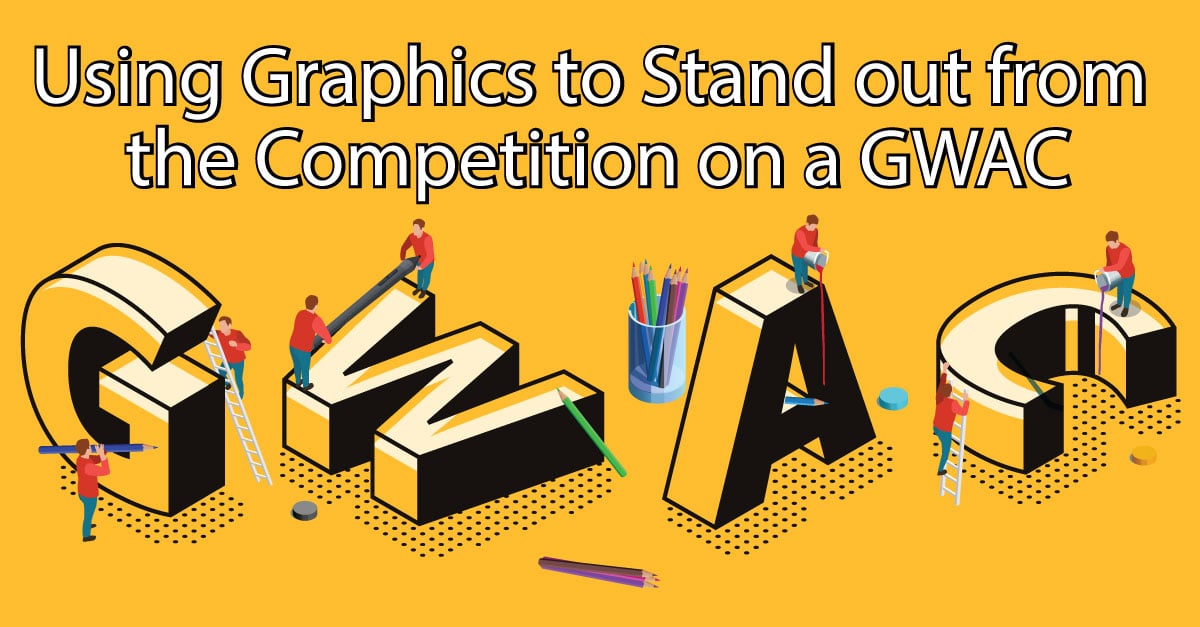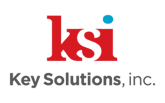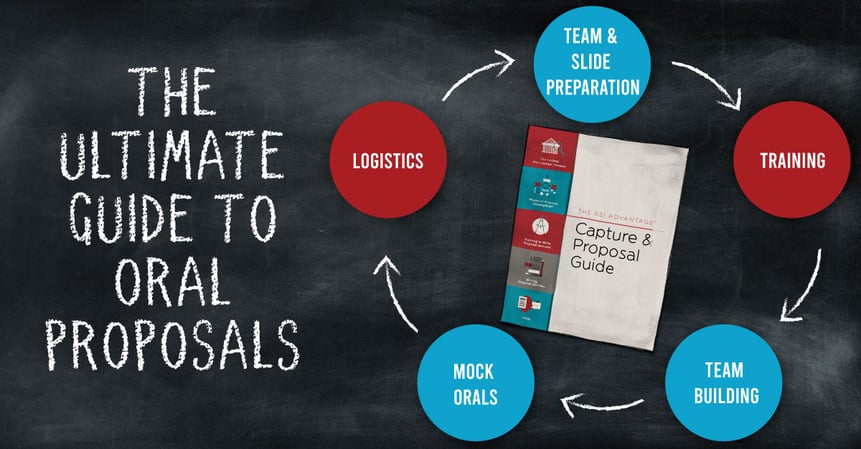
An oral presentation with the government is like a job interview. Your goal is to present well and ultimately win the contract.
Oral presentations are becoming a more common requirement in government proposals, so it’s necessary to have a process that empowers both team chemistry and smooth performance.
The KSI Advantage™ Orals Process emphasizes rigorous planning as the pathway to success and breaks down orals into five manageable phases.
In this article, I will discuss the five phases of the KSI Advantage™ Orals Process and share what our KSI Advantage™ Capture & Proposal Guide can do to help you prepare your oral presentation for success!
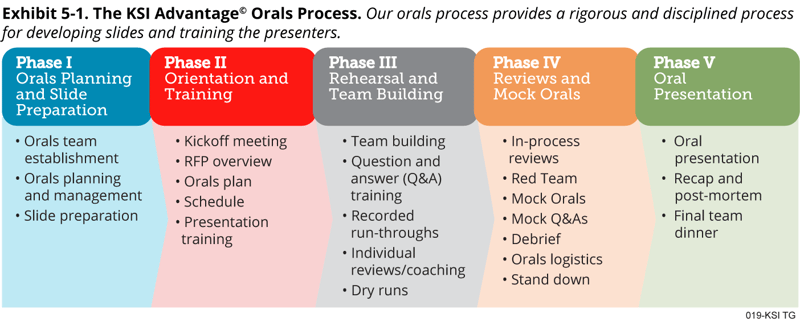 *This graphic is from the KSI Advantage™ Capture & Proposal Guide.
*This graphic is from the KSI Advantage™ Capture & Proposal Guide.
Phase One: Orals Planning and Slide Preparation
First, you must establish a dedicated team to prepare and execute the Orals Process. You will need four key personnel:
- Orals Manager – responsible for the overall Orals Process, approving strategies and plans, and directing the team
- Orals Slidemaster/Coordinator – responsible for providing the orals PowerPoint slides, managing logistics, and directing the production
- Orals Coach or Training Manager – responsible for executing strategy and plans, leading team building, and orientation
- Mock Orals Board Chairperson – responsible for simulating the Source Evaluation Board (SEB) review process and conducting Mock Orals
These roles can be combined, but make sure somebody has these responsibilities assigned to them. The Slidemaster is responsible for making an Oral Proposal Development Schedule. This schedule should allocate adequate time for an Oral Proposal Kickoff Meeting, Slide Preparation, Slide Reviews, Team Building, and Mock Orals.
The Slidemaster should also make a Speaker/Slide Matrix to plan the presentation within the assigned presentation time. This matrix assigns presenters their sections, allocates their presentation time, and develops a speaking order.
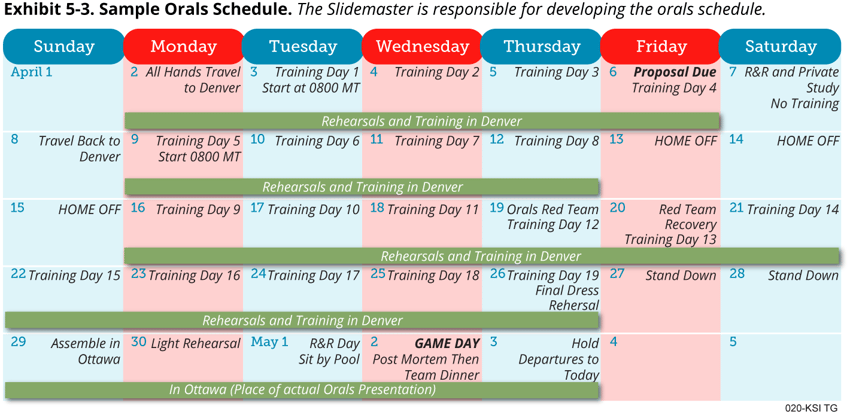 *The Sample Orals Schedule graphic is from the KSI Advantage™ Capture & Proposal Guide.
*The Sample Orals Schedule graphic is from the KSI Advantage™ Capture & Proposal Guide.
Examples of a 30-day Oral Proposal Development Schedule (Exhibit 5-3) and a Speaker/Slide Allocation Matrix (Exhibit 5-4 and Appendix-41) are available in the Guide for your reference.
Each orals presenter is responsible for the final state of their PowerPoint slides and coordinates with the Slidemaster after the Orals Presentation Kickoff to revise and finalize their slides. The slides must be pithy and not dense and should include plenty of color, graphics, and diagrams.
The KSI Guide recommends using our Slide Master© process to develop slides that best present your data and themes. Our Slide Master© template allows you to organize any major points, transitions, graphics, action captions, or major marketing messages you might want to include. A blank template ready for editing is available in Exhibit 5-5 and Appendix-42 of the Guide!
Phase Two: Orientation and Training
The Orals Coach, aka the Training Manager, needs to coach their team to present themselves honestly and directly.
They should give group and one-on-one coaching to their team on public speaking skills and sales pitching, as well as conduct proposal-specific training on win strategy, themes, discriminators, etc. Depending on the proposal, the Training Manager may also need to provide special coaching for the Project Manager and other key personnel, who are sometimes asked to interview individually with the Source Evaluation Board (SEB).
During orals presentations, the government will often ask proposal-specific questions for the presenting team to answer. Q&As can be very stressful, so it’s part of the Training Manager’s job to train presenters on how to answer effectively.
The KSI Advantage™ Process uses the Straight Answer Model Method for Q&As, which entails:
- Answering the question,
- Giving details and proof, and
- Highlighting benefits.
Phase Three: Rehearsal and Team Building
It’s important that your team members feel connected to one another and motivated to collaborate. A solid Orals team is built upon three principles: a sense of purpose, respect for the customer, and a focus on the customer’s success and satisfaction.
To instill this, KSI recommends orals teams practice our Six-Step Team Building Process:
- Tell Us Your Story – share with your teammates about who you are and what you add to the team.
- Define the Extraordinary Business Challenges That Confront You – ask yourself what major issues and challenges you need to surmount with your proposal.
- Stand for Something That Makes A Difference – demonstrate you understand and care about the customer's needs.
- Create Strategic Goals/Objectives for Your Organizational Unit – ask yourself what specifically you will do to help the customer achieve the needs and goals of their solicitation.
- Develop Your Action Plan – get into the details of what success will look like when performing the awarded work, what key actions you’ll need to take, and who specifically you will need to get the job done.
- Figure Out How to Integrate Steps 1-5 Into Your Presentation – find a way to compliantly integrate your conclusions from Steps 1-5 into your orals proposal.
Phase Four: Reviews and Mock Orals
The review process when building an oral presentation is conducted by performing rehearsals. These Mock Orals are performed in front of a group of participants meant to represent the actual SEB members.
The feedback from this Mock SEB helps ensure the presentation meets the following goals:
- Compliance – verifying you are meeting the requirements of Sections C, L, and M
- Clarity – ensuring the material is succinct and understandable
- Consistency – checking that your terms and data are uniform
- Accuracy – confirming your information is correct
- Strategy – articulating your strategy and win themes
- Performance – ensuring presenters communicate properly
Mock SEB members should be knowledgeable people but unfamiliar with the proposal. They will review the presentation for technical accuracy, compliance, and delivery.
The KSI Orals Process advises scheduling two days for Mock Orals, including time for the Mock SEB to review the RFP and written proposal beforehand. Following this review, the Mock Orals Leader should answer any questions the Mock SEB may have and share with everyone the protocol for the Mock Orals. We suggest a dress rehearsal to mimic the actual oral presentation.
A sample Mock SEB/Orals Schedule is available for reference (Exhibit 5-8) in the Guide, along with a Mock SEB Participant List template (Exhibit 5-7).
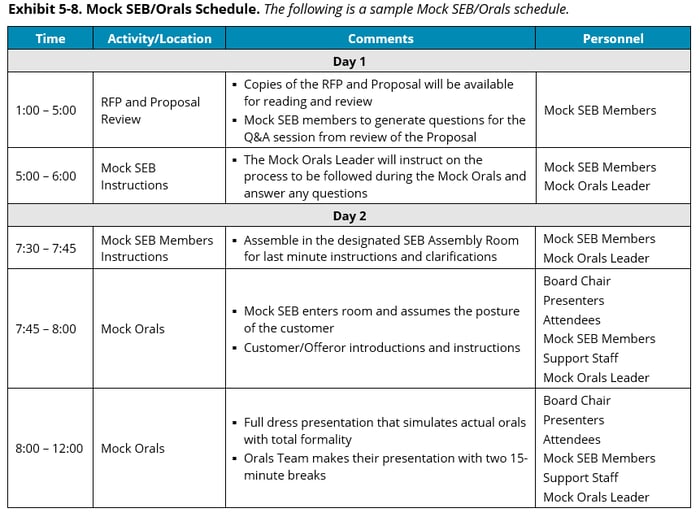
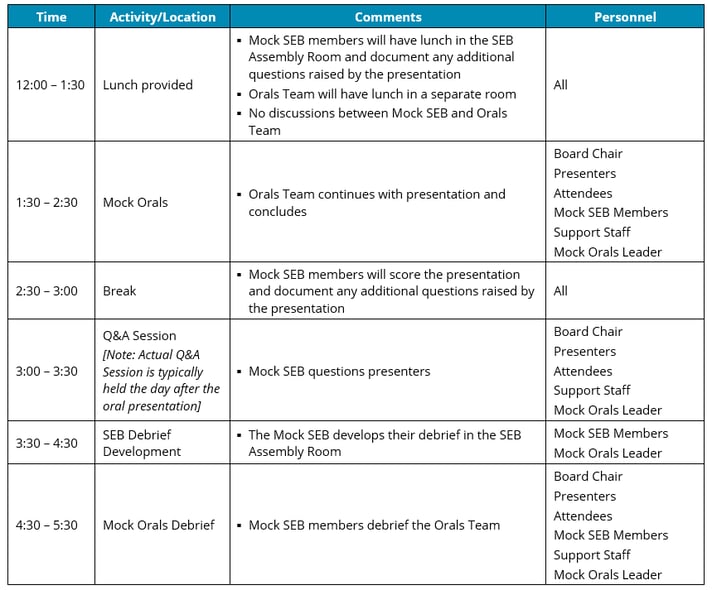 *This Sample Mock SEB/ Orals Schedule is from the KSI Advantage™ Capture & Proposal Guide.
*This Sample Mock SEB/ Orals Schedule is from the KSI Advantage™ Capture & Proposal Guide.
During the Mock Orals Presentation, the Mock SEB will evaluate the presentation using forms similar to what will be used by the real SEB. These forms include:
- RFP Scoring Tree – to score according to the RFP requirements
- Criterion/Sub-Criterion Evaluation Form – completed for each criterion/sub-criterion
- Questions Form – for anything the Mock SEB may want to ask post-presentation
- Q&A Summary Evaluation Form – to evaluate the Q&A portion of the Mock Orals
- Presenter Evaluation Form – to evaluate each presenter’s style and effectiveness
Templates for all of these forms, ready for you to use, can be found in Appendices 44-48 in the Guide!
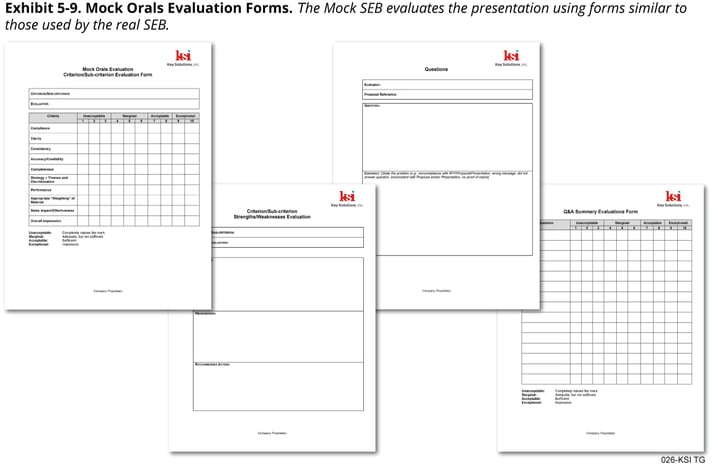
*The Mock Orals Evaluation Forms graphic is from the KSI Advantage™ Capture & Proposal Guide.
Phase Five: Orals Logistics
Once every step has been made to prepare for the day of the presentation, the Orals Manager should remind everyone of all protocols and logistics. This includes dress code, schedule, transportation, post-mortem wrap-ups, and proper note-taking.
If you’ve followed each phase of the KSI Advantage™ Orals Process, learned your part well, practiced your speaking voice, and shined your shoes, you should be ready! Going through each of the five phases of the Orals Process will lead to a better team, a refined presentation, and a good result.
In Conclusion
There are three reasons why the government asks for oral presentations. They want to see how well you know the work of the RFP, how well your team works together, and how easily their agency could work with you. Consciously or unconsciously, these three criteria will be in the SEB’s mind as you talk about your solution and strategy. You must deliver a well-crafted and eloquent presentation.
Solid orals preparation and following the Orals Process of the KSI Advantage™ Capture & Proposal Guide, can lead to a difference-making presentation. Our Guide contains over 35 years of Key Solution’s best practices and discusses the Orals Process in far better detail than I have here. It’s chock full of useful tips, templates, and time-tested processes that can help anybody in a proposal role, whether you’re a Capture Manager, Proposal Manager, Technical Writer, or Orals Coach. Happy presenting!


